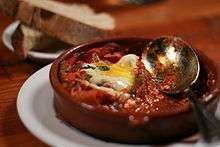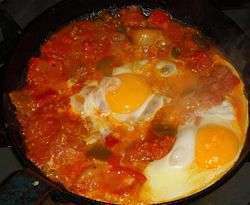Shakshouka

Shakshouka or shakshuka (Arabic: شكشوكة);is a dish of eggs poached in a sauce of tomatoes, chili peppers, and onions, often spiced with cumin. In its present egg and vegetable-based form it is of Tunisian and Moroccan Jewish origin,[1] and is now popular among many ethnic groups of the Middle East and the Maghreb.[2][3]
Etymology
Shakshouka means "a mixture" in Libyan Arabic or other Maghrebi Arabic dialects.[4] It is likely that it was first known as chakchouka, a Berber word meaning a vegetable ragout,[4] although "shakshek" means "to shake", in Libyan Arabic, Berber and Hebrew, giving a possible Punic origin to the name of the dish.[5]
Chakchouk is also a very common surname in Tunisia.[6]
History


Shakshouka is a staple of Tunisian, Libyan, Algerian, Moroccan, and Egyptian cuisines, traditionally served in a cast iron pan or tajine with bread to mop up the sauce. It is also popular in Israel,[7] where it was introduced by Tunisian Jews and other Maghrebi Jews, hundreds of thousands of whom immigrated to Israel during the 1950s.[5]
According to food writer Claudia Roden, Tunisian cooks added artichoke hearts, potatoes and broad beans to the dish. Because eggs are the main ingredient, it is often on breakfast menus, but in Israel, it is also a popular evening meal.[8] It has been said to challenge hummus and falafel as a national favourite, especially in the winter.[4] According to some food historians, the dish was invented in the Ottoman Empire, spreading throughout the Middle East and Spain, where it is often served with spicy sausage. Another belief is that it hails from Yemen, where it is served with zhug, a hot green paste.[4] Some versions include salty cheeses[8] but traditional recipes are very basic, consisting merely of crushed tomatoes, hot peppers, garlic, salt, paprika, olive oil and poached eggs.[9]
Similar dishes
Shakshouka is similar to the Turkish dish menemen. Turkish cuisine has another dish with a similar name, spelled şakşuka, which is more like a ratatouille. Shakshouka is also similar to Spanish pisto manchego, a traditional La Mancha dish from southeast Spain, sometimes also accompanied by a fried egg.
See also
- Arab cuisine
- Cuisine of the Sephardic Jews
- Middle Eastern cuisine
- North African cuisine
- Cuisine of Israel
- List of African dishes
- List of stews
References
- ↑ Marks, Gil (2010). Encyclopedia of Jewish Food. New York: John Wiley & Sons. p. Shakshouka section. ISBN 978-0-470-39130-3.
- ↑ Roden, Claudia (2000). The New Book of Middle Eastern Food - Revised Edition. Knopf. p. 168. ISBN 0-375-40506-2.
- ↑ International Inner Wheel Sfax, Nos recettes de tous les jours et jours de fêtes, p115.
- 1 2 3 4 Josephs, Bernard (October 8, 2009). "Shakshuka: Israel's hottest breakfast dish". The Jewish Chronicle.
- 1 2 Gur, Janna (2008). The Book of New Israeli Food: A Culinary Journey. Schocken. pp. 80–82. ISBN 0-8052-1224-8.
- ↑ Chakchouk, Family Name (2013-01-24). "Myheritage Tunisian Surname 737.974 documents". Myheritage.
- ↑ Holy Grill food truck is a taste of Israel in downtown LA
- 1 2 Clifford-smith, Stephanie (June 7, 2011). "Three of a kind: Shakshouka". Sydney Morning Herald. Archived from the original on 2011-08-27.
- ↑ Abitbol, David (October 28, 2004). "The REAL Shakshuka". Jewlicious.
| Wikibooks has a book on the topic of: Cookbook:Shakshouka |
| Wikiquote has quotations related to: Shakshouka |
Egyptian